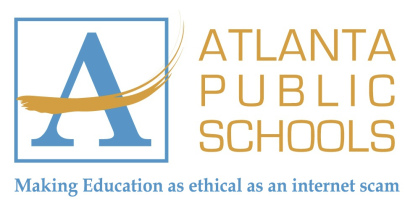 Further thoughts on running a school district like a criminal enterprise.
Further thoughts on running a school district like a criminal enterprise.
The Atlanta Cheating Scandal (or “APS Scandal” for Atlanta Public Schools) essentially began in 2009 after the Atlanta Journal Constitution published statistical anomalies in state competency tests that showed suspicious numbers of teacher corrections in 58 Atlanta schools.
By 2011, the Georgia Professional Standards Commission had uncovered cheating by close to 178 educators in 44 of 56 Atlanta schools that were investigated. Students were either directly provided with correct answers or teachers changed incorrect answers on tests after they’d been turned in. They did this, in short, to either collect bonuses or keep their jobs, and anyone who tried to shed light on the fraud reportedly lived in fear of retaliation.
 On April 1, 6 years after it all began, 11 of the 35 educators accused of conspiring to cheat on state standardized tests, racketeering, theft, witness intimidation, and more were convicted and sentenced. Because the bunch consisted of lunch-bag teachers, testing coordinators, and school administrators (as opposed to the mobsters one typically associates with racketeering charges), they turned on each other faster than you can say, “But she parked in my designated spot!”
On April 1, 6 years after it all began, 11 of the 35 educators accused of conspiring to cheat on state standardized tests, racketeering, theft, witness intimidation, and more were convicted and sentenced. Because the bunch consisted of lunch-bag teachers, testing coordinators, and school administrators (as opposed to the mobsters one typically associates with racketeering charges), they turned on each other faster than you can say, “But she parked in my designated spot!”
Yet as the book closes on the APS scandal – considered the biggest school cheating scandal in American history – the argument that teachers were forced to cheat because they weren’t given enough incentive not to remains in full effect.
Here’s the deal: In a 2013 press release, leaders of the American Federation of Teachers and the Georgia Federation of Teachers sought to take some heat off the accused with what I saw as a kindergarden caliber excuse. The unions insisted the “test-crazed policies” mandated by No Child Left Behind (NCLB) were to blame instead, because they dominate academic achievement and create a culture of endless assessment where more than 100 days each year can be eaten up by test prep (though not very effective test prep, it seems).
 Now, I’m willing to concede the likelihood that cheating “will proliferate as long as educators are evaluated on the basis of deeply flawed rating systems.” And I’m no fan of NCLB (or much of anything W. accomplished as President); I think it’s a vulgar blend of teacher evaluation and the dangled carrot of Federal funding in pursuit of multi-purpose and minimally effective standards, resulting in ratings that make test scores themselves a classroom destination. But needing to fix the system doesn’t give license to use it as an excuse to alter reality.
Now, I’m willing to concede the likelihood that cheating “will proliferate as long as educators are evaluated on the basis of deeply flawed rating systems.” And I’m no fan of NCLB (or much of anything W. accomplished as President); I think it’s a vulgar blend of teacher evaluation and the dangled carrot of Federal funding in pursuit of multi-purpose and minimally effective standards, resulting in ratings that make test scores themselves a classroom destination. But needing to fix the system doesn’t give license to use it as an excuse to alter reality.
No matter what the National Bureau of Economic Research says about the relationship between incentives and teacher behavior, I wasn’t buying the union’s excuse then, and I’m not buying it now. When a teacher falsifies test results to either enrich him or herself, circumvent procedure, or save his or her job, it’s a matter of poor coping skills – period.
For a different take on APS, who but Stewart & Co. bullseye this topic better?
